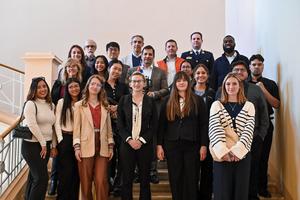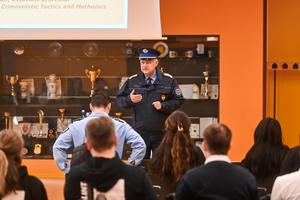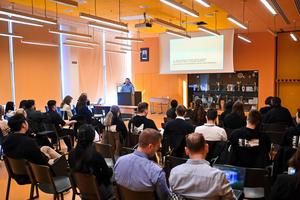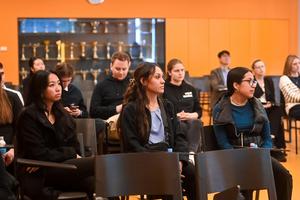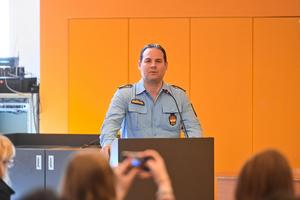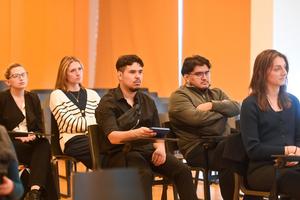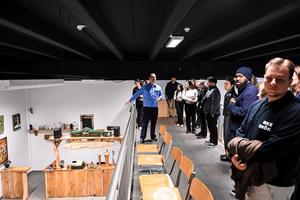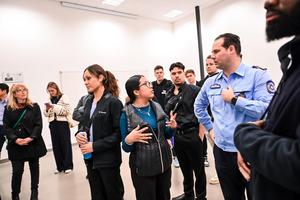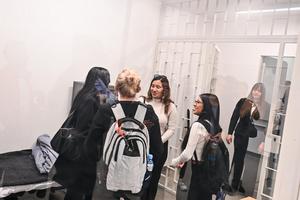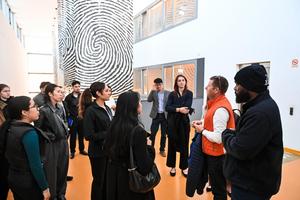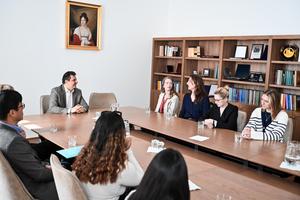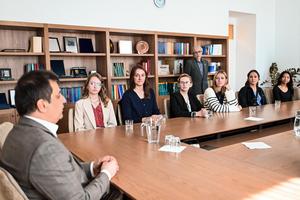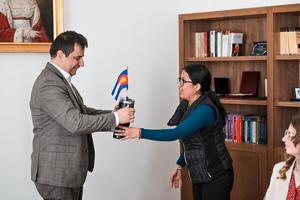A group of students from the Metropolitan State University of Denver (MSUD) in the United States visited Ludovika–University of Public Service (LUPS) on March 20 to learn about the functioning of the Hungarian public service—particularly law enforcement training—and to explore Hungarian culture. The more than week-long visit also aims to provide the American students with a comprehensive understanding of Hungary's public administration, legal system, and public security, allowing them to compare these aspects with American practices.
The two institutions also signed a cooperation agreement in 2024. Currently, Brigadier General László Christián, the Vice-Rector for Education at LUPS, is a visiting professor at MSUD through a Fulbright scholarship and is working as a Fulbright Visiting Scholar.
On the first day of the American students' visit, Major General Gábor Kovács, Dean of the Faculty of Law Enforcement (FLE), emphasized in his welcome speech that MSUD students now have the opportunity to gain insight into the operations of Hungary’s only university dedicated to training future public service professionals. He highlighted that FLE trains specialists not only for law enforcement agencies but also for the private security and municipal sectors. At the end of his speech, Gábor Kovács encouraged the students to immerse themselves in Hungarian culture and try local specialties in addition to participating in the professional programs.
Following the welcome speech, Colonel Bence Mészáros, associate professor, introduced LUPS in detail as a prelude to his lecture on Hungary’s criminal justice system and other critical issues, touching on the Ludovika traditions and the university’s five faculties.
The head of FLE’s Department of Criminal Tactics and Criminal Methodology explained that students at the faculty can pursue their studies in full-time three- or four-year undergraduate programs, part-time three-year undergraduate programs, as well as two-year master's programs. Additionally, doctoral studies and specialized advanced training programs are also available, along with Erasmus+ courses offered at FLE.
Bence Mészáros highlighted that FLE students receive not only theoretical knowledge but also thorough practical training, referring to basic law enforcement training, the officer cadet exam, and the tactical house with its various training rooms in the Law Enforcement Training Building.
The police colonel informed the American students that officer cadets actively participate in various tasks even during their studies. For example, in 2022, they assisted refugees arriving in Hungary due to the Russian-Ukrainian armed conflict. Additionally, in September 2024, the FLE Law Enforcement Division and its instructors took part in flood defense preparations in the village of Pilismarót. As recognition, a government decision awarded 330 students and 19 instructors the Flood Defense Commemorative Medal on March 13 this year.
Bence Mészáros then discussed the Hungarian judicial system and the various activities of investigative authorities. He mentioned the recently established Delta program, which was created to eliminate drug trafficking in Hungary, in response to the constitutional prohibition of drug distribution, trade, and promotion.
As part of the visit, MSUD students toured the Law Enforcement Training Building, received information about extracurricular activities and dormitory life at the university, and participated in a campus tour, which concluded with a reception by Rector Gergely Deli in his office.
During their stay in Hungary, the students will visit numerous important institutions, including Buda Castle, Fisherman’s Bastion, the Police Headquarters, St. Stephen’s Basilica, the Parliament, the Supreme Prosecutor’s Office, and the National Headquarters of Penitentiary Institutions. They will also explore famous landmarks of the capital, such as Heroes’ Square, Vajdahunyad Castle, and Gellért Hill. Additionally, they will take a one-day excursion to Kecskemét, where they will learn about local governance and public administration.
Text: Zsófia Sallai
Photo: Dénes Szilágyi
